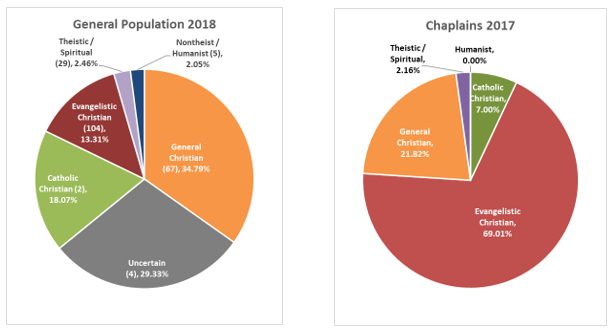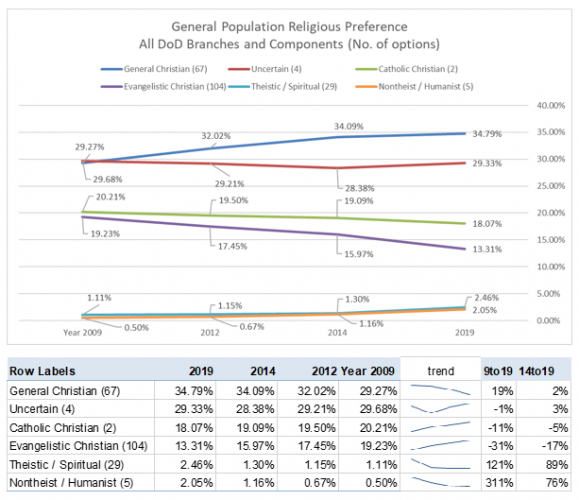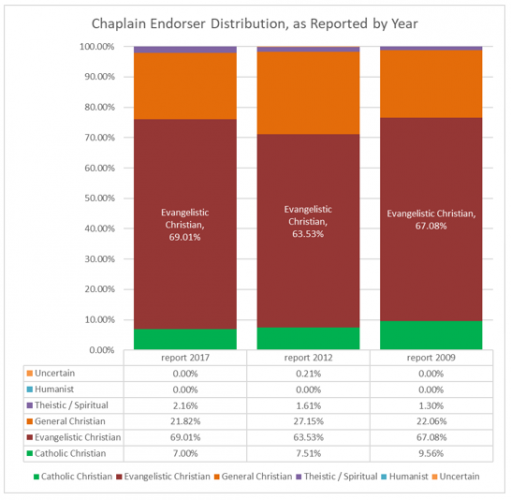Chaplain endorsements continue to diverge from military personnel
Overview: The charts below show the statistical results of these FOIA requests. Populations match in that the 2017 compliance year are chaplains available to serve the 2018 population. We find a large unknown population in the military, a significant humanist/nontheist population unrepresented in the chaplaincy, and a bias toward Christianity and Evangelistic Christianity in the chaplaincy.
Note: the report below and additional commentary can be found in the attached PDF. Even more background including Excel and original submissions will be made available shortly. This publication is the first of several. We welcome feedback and commentary, especially from those agencies and denominations mentioned here.
Demographics reporting history

Major Finding 1: The AFCB has no mechanism to ensure its chaplains are endorsed properly and currently. While at least some endorsing agencies provide lists of chaplains to the AFCB, the AFCB attested in refusing this FOIA request, that it has no internal listing of approved endorsements of its chaplains. Therefore, if a current chaplain appears on no list submitted by endorsers or appears on a different endorser’s list, the AFCB has no way to verify or oversee that change. Such changes would be impermissible without authorization per DoDI1304.28 and as such the AFCB cannot be fulfilling its oversight responsibilities regarding chaplain endorsements. DoD leaders should step in to put such a mechanism in place and to remediate any overdue or improper endorsements previously unnoticed by the AFCB.
Major Finding 2: The AFCB disregards its duty to non-Christian service members by maintaining a chaplain corps that is statistically biased toward Christians in general, toward Evangelistic Christians in particular, and against nontheists and humanists in particular. Chaplaincy endorsements are over 97% Christian (vs under 35% of the general population), over 66% Evangelistic Christian (vs under 14% of the general population), and humanist endorsing agencies and candidates continue to be turned away. Humanist endorsing agencies such as The Humanist Society, the American Ethical Union, or the Society for Humanistic Judaism would be agencies that meet all DoD regulations.
This finding relies additionally on lack of recruitment dollars, advertising, and regulatory changes to open the chaplaincy to non-Christians. This finding also relies on the bias in number and focus of chapel-level programming geared toward non-Christians. Without top-down and bottom-up effort to orient the chaplaincy to balance the focus on Christian vs non-Christian programs, the chaplaincy will continue to be, by definition, biased toward Christians. These additional items are not included this study, which focuses only on statistical bias of membership.
Major Finding 3: The Department of Defense has a poor understanding of the religious diversity of its members, with nearly 30% unknown. The DoD made an important change in 2017 by consolidating and improving its top-level demographics categories to include over 200 options including humanist. The memo, titled “faith and Belief Codes” and dated Mar 27, 2017 from the Office of the Assistant Secretary of Defense, claimed “The AFCB asserts that these changes… will better assist… religious support planning”. Unfortunately, the AFCB has never embraced these changes, has taken apparently no action to expand its services, and maintains firmly that the changes are purely for personnel tracking and unrelated to chaplaincy support. This lack of support has contributed to lack of adoption and training, such that trainees and members are less able to take advantage of the expanded categories. The unknown categories likely correspond directly to the underserved non-Christian population declining to participate in the overall DoD religious and spiritual programs and demographics.
Source: Freedom of Information Act (FOIA) requests 2009-2019 through Department of Defense (DoD) FOIA office and specifically From Defense Manpower Data Center (DMDC) and Armed Forces Chaplains Board (AFCB). All requests gathered, compiled, and analyzed by the Military Association of Atheists & Freethinkers (MAAF, militaryatheists.org). Special thanks to additional reviewers including members of the Forum on the Military Chaplaincy.
Source Comments: FOIA results generally took several months or more and had noticeable omissions and obfuscations. The chaplaincy provided 2017 data in response to 2018 and 2019 data requests. Detailed source information, caveats, and reviews are available on request. Major findings rely on obvious trends over 10 years of data sets and are unlikely to be influenced by compilation errors.
Excerpt of FOIA requests submitted Oct 2018: (to DMDC) The DoD maintains information on religious preference. (1) We request dated output of the most recently available self-described religious preference of all service members in all branches and components. (to AFCB) I would like (1) each document on file with the DoD pursuant to DoDI 1304.28 Section E3.1.8 for the January 2018 deadline. I further request (2) a listing by endorsing body of the number of chaplains in each branch and component. Information should NOT include self-identified religious preference for chaplains according to Faith and Belief Codes, e.g., Southern Baptist, Catholic, or Muslim.
FOIA 19-F-0162,3
General Population Summary: Note that MAAF has categorized individual religious preferences and endorsers based on the best available information and collaboration with religious experts. Over the past 10 years, we have sought and changed entries for reasonable objections. The category ‘evangelistic’ has been most problematic. It is as-such to distinguish denominations who seem to value the “Great Commission” to convert others and enforce their religious beliefs in their work over the “Great Commandment” to love others. MAAF feels these categorizations are fair and meaningful in the ways the normal Christian-centric categories of “Catholic, Protestant, Jewish, Other” are not. The categories provide brought theological distinctions that are relevant for religious support while maintaining some statistical significance among the population.

Chaplaincy Data has improved over time but is still delayed and not entirely transparent. That having been said, the best available data directly from the Armed Forces Chaplains Board through the FOIA office is listed here and is useful for trends and major take-aways. Also see the previous note about MAAF categories, which are consistent between the General Population and the chaplain endorsers for valid comparison. The chaplaincy has “grandfathered” some endorsers for ‘executive endorsement’ meaning large agencies can represent churches to the Department of Defense, limiting church involvement in endorsement and obscuring ‘sending’ churches who provide chaplains to the military. They do generally have a faith mission and that is reflected here. Lastly note that uncertainty in these findings represents uncertainty of the AFCB about its own chaplains, not uncertainty within the data provided.

